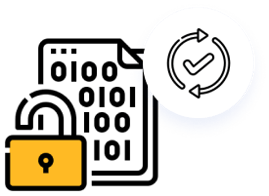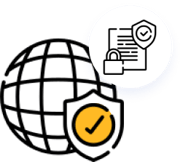Fast-Track Your HIPAA Compliance Efforts with PureDome
Streamline HIPAA compliance and accelerate compliance efforts with our comprehensive, easy-to-implement solutions.

What is the Health Insurance Portability and Accountability Act (HIPAA)?

The Health Insurance Portability and Accountability Act was initially focused on addressing insurance coverage gaps for individuals transitioning between jobs. Without this legislation, individuals would have risked losing their insurance coverage during job transitions.
Another objective was to guarantee the proper security of all data, preventing unauthorized individuals from accessing healthcare information. HIPAA is applicable within the United States and is governed by the Department of Health and Human Services' Office for Civil Rights (OCR).
HIPAA was established to modernize the exchange of healthcare information and ensure the protection of Personally Identifiable Information collected by healthcare and insurance entities, safeguarding it from fraud and theft and preventing unauthorized disclosure.
Patient healthcare information is handled with increased sensitivity, allowing swift access by different healthcare providers. HIPAA laws and regulations mandate enhanced security measures to prevent data leakage. For comprehensive guidance on HIPAA regulations and compliance, you can refer to HIPAA Journal, an excellent resource with a detailed checklist for your compliance journey.
Who Does HIPAA Apply To?
.png)
HIPAA regulations apply to health plans, healthcare clearinghouses, qualifying healthcare providers, and Business Associates that provide services on behalf of Covered Entities. Additionally, HIPAA mandates that vendors of personal health records report data breaches to the Federal Trade Commission under the Breach Notification Rule.
HIPAA Compliance Essentials

Privacy Rule

Security Rule

Breach Notification Rule

Omnibus Rule
Enforcement Rule
How PureDome Supports Compliance for Covered Entities & BAs
Continuous Data Encryption
Utilizing advanced technologies, we consistently ensure data confidentiality during transmission. Our shared gateways operate with cutting-edge VPN protocols, guaranteeing encrypted data transfer and anonymizing your IP on the open internet.

Zero Trust Approach
PureDome adopts a zero-trust security model to safeguard data governed by compliance directives. This approach includes rigorous verification steps such as two-factor authentication (2FA) and single sign-on (SSO), ensuring robust and secure network control.

Device Posture Check
Continuous inspection of devices enhances your network security and health assessment. PureDome's HIPAA-compliant solution strengthens secure remote access through device posture checks. You can evaluate users' devices based on predefined security criteria and receive alerts about non-compliant devices.

Effective Monitoring and Logging
Proactively prevent and investigate incidents through comprehensive network activity monitoring and secure communication channel oversight. PureDome facilitates detailed inspection of usage logs, identifying users of secured connections and their activity timelines.

Need a cybersecurity solution that supports your HIPAA compliance journey?

Frequently Asked Questions (FAQs)
What does HIPAA not cover?
Although HIPAA establishes standards for electronic transactions and security to improve healthcare delivery, it does not include requirements related to the quality of care.
How does HIPAA compliance apply in healthcare?
HIPAA compliance in healthcare involves meeting the standards set by HIPAA, its amendments, and related laws such as HITECH. Organizations that handle protected health information (PHI) must implement security measures across physical, procedural, and network domains to ensure compliance.
What qualifies as PHI under HIPAA?
Protected Health Information (PHI) encompasses any individually identifiable data related to a patient's physical or mental health condition, healthcare services provided, or payment for those services. This includes names, addresses, Social Security numbers, medical records, and other confidential health-related information.
What technology is required for HIPAA compliance?
For HIPAA compliance, your technology must provide secure data storage, access control, user authentication, encryption, audit logging, and activity monitoring. It should also allow for role-based access, ensuring individuals can only access the data necessary for their roles.
Do small healthcare practices need to comply with HIPAA?
Yes, HIPAA compliance is mandatory for all covered entities, regardless of size. This includes any healthcare provider, health plan, or healthcare clearinghouse that electronically transmits health information for certain transactions, as well as business associates that manage patient data.
What constitutes a HIPAA violation?
A HIPAA violation occurs when a breach in the compliance program compromises the integrity of PHI or ePHI. Such violations can happen due to a breach of the company's HIPAA policies or an ineffective or outdated compliance program.